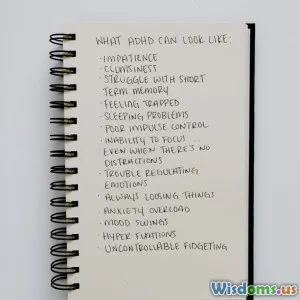
Mastering Emotional Intelligence for Better Living
8 min read Unlock the secrets of emotional intelligence to enhance your daily life and relationships. (0 Reviews)
Mastering Emotional Intelligence for Better Living
In today’s fast-paced world, emotional intelligence (EI) plays a pivotal role in navigating life’s challenges. The ability to understand, manage, and use emotions effectively is no longer a soft skill; it is crucial for personal and professional development. In this article, we unravel what emotional intelligence entails, explore its importance, and provide actionable strategies to master it.
Understanding Emotional Intelligence
Emotional intelligence refers to the ability to identify and manage one's own emotions and the emotions of others. Psychologist Daniel Goleman, who popularized the term in his 1995 book Emotional Intelligence, identified five key components:
- Self-awareness - Recognizing your own emotions and their effects.
- Self-regulation - The ability to control your emotions and impulses.
- Motivation - Harnessing emotions to pursue goals with energy and persistence.
- Empathy - Understanding the emotions of others.
- Social skills - Managing relationships to move people in desired directions.
Research consistently shows that individuals with high emotional intelligence tend to have better relationships, succeed at work, and lead healthier lives. A study from TalentSmart found that emotional intelligence accounts for 58% of performance in a wide range of jobs. This underscores the necessity of cultivating emotional intelligence in various aspects of life.
The Role of Self-Awareness in Emotional Intelligence
Self-awareness is the foundation of emotional intelligence. By being in tune with your own emotions, you can understand their impact on your thoughts and behaviors.
For instance, when you notice you’re feeling anxious or upset, acknowledging these feelings gives you a chance to pause and assess the situation before reacting. This could prevent potentially destructive behavior, such as snapping at a work colleague or making hasty decisions in high-stress environments.
Strategies to Enhance Self-Awareness
- Reflective Journaling: Spend a few minutes each day writing about your emotions and experiences. This can clarify emotions and patterns over time.
- Mindfulness Meditation: Practicing mindfulness helps you stay present, focusing on your feelings without judgment, enabling a deeper understanding of your emotional state.
- Feedback from Others: Encourage peers, family, or friends to share their perspectives on your emotional responses. This external validation can provide insights into blind spots you may have.
Self-Regulation: Gaining Command Over Your Emotions
Once you are aware of your emotions, the next step is self-regulation. It involves managing your emotions in a healthy way, particularly during stressful situations.
Consider the example of conflict at work; self-regulation helps you pause before responding, thus avoiding unwanted escalation. Efficient self-regulation can foster a much calmer atmosphere.
Techniques for Better Self-Regulation
- Deep Breathing: This simple technique can quickly reduce the intensity of your emotions and help you think more clearly.
- Cognitive Restructuring: Challenge negative thoughts by reframing your perspective of the situation. For instance, instead of thinking, “This is impossible!” consider, “I can find a way to address this issue.”
- Practice Delayed Gratification: Train yourself to delay responses, allowing for thoughtful actions instead of impulsive ones.
Empathy and Its Importance in Relationships
Empathy is crucial for nurturing meaningful connections with others. It is the ability to understand and share the feelings of another person. Research from the University of Michigan reveals that empathy levels in society have dropped significantly in recent decades, leading to poorer interpersonal relationships and increased misunderstandings.
When you exhibit empathy, you not only resonate with others but also provide meaningful support which can strengthen bonds. For example, if a friend experiences loss, providing compassionate understanding is more impactful than merely offering advice.
Cultivating Empathy
- Active Listening: Fully concentrate on what is being said, instead of planning your response while the other person talks. Repeat back what you hear to clarify understanding.
- Try to “Walk in Their Shoes”: Approach situations from the other person’s perspective, considering their context, feelings, and reactions.
- Volunteering: Engaging in community service introduces you to diverse situations that challenge your perspectives and foster compassion.
Advancing Social Skills for Better Communication
Social skills encompass the abilities needed for effective interactions and managing relationships. A strong social skill set allows one to navigate through social complexities, thus enhancing teamwork and fostering positive relationships.
For example, successful leaders often rely on emotional intelligence, particularly social skills, to maintain a cohesive team. Effective communication helps in resolving conflicts and encouraging collaboration.
Strengthening Your Social Skills
- Attend Networking Events: Practice striking up conversations with unfamiliar people, which can help improve your comfort in social interactions.
- Observe Others: Watching skilled communicators can provide insights into effective social strategies and techniques.
- Join Group Activities: Engaging in team sports or community organizations fosters cooperation and collaboration with diverse groups.
Emotional Intelligence in the Workplace
In professional settings, emotional intelligence can significantly influence workplace dynamics, leadership effectiveness, and overall organizational success. A study by the Institute for Social Research indicates that teams with high emotional intelligence have better performance levels and foster healthier work environments.
Transformative leaders often possess high emotional intelligence, enabling them to connect with teams on a personal level, motivating them and increasing productivity. By creating an emotionally healthy workplace, companies can reduce turnover by as much as 50%, according to a report by Gallup.
Conclusion: Taking Action Towards EI Mastery
Mastering emotional intelligence is not inherently easy, but the benefits it brings to personal and professional realms are profound. The first step involves attaining self-awareness, and from there, fostering self-regulation, empathy, and ultimately social skills. Actions taken towards continuous improvement in these areas will lead to enriched relationships and greater contentment in life.
Recognizing the importance of emotional intelligence, it’s essential to make a commitment to self-improvement. Start today by integrating one or two of the discussed strategies into your daily routine. With patience and dedication, you can master the art of emotional intelligence, significantly enhancing your life in the process.
Rate the Post
User Reviews
Popular Posts





















